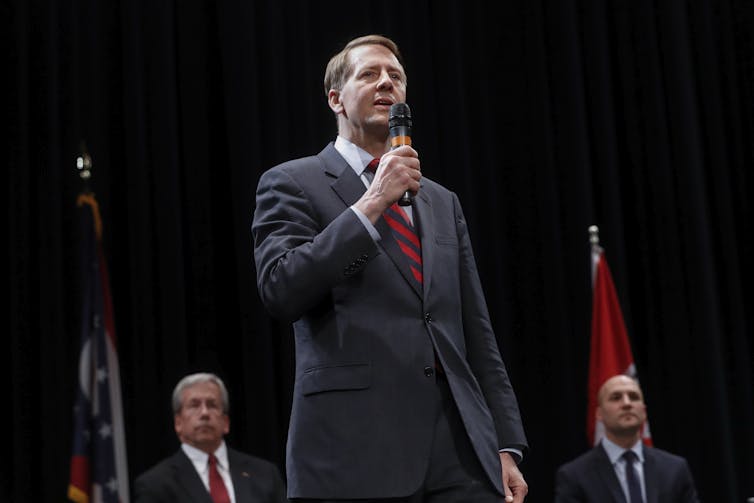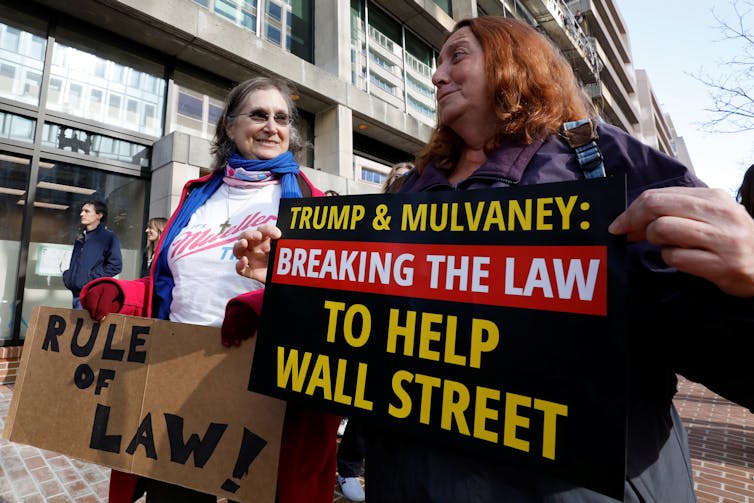Mick Mulvaney turned the CFPB from a forceful consumer watchdog into a do-nothing government cog
- Written by Jeff Sovern, Professor of Law, St. John's University
Until last Thanksgiving, the Consumer Financial Protection Bureau[1] was known for forcefully pursuing its core mission, returning nearly US$12 billion to about 30 million consumers who had been taken advantage of by financial institutions.
But since then, the bureau has been known[2] for … well, not much. After Obama-appointee Richard Cordray stepped down in November, President Donald Trump named as interim director, his budget chief Mick Mulvaney, who has long been a foe[3] of the CFPB.
The president recently nominated[4] a new permanent director – who has no consumer finance experience but is one of Mulvaney’s own deputies at the Office of Budget and Management – for a five-year term, with hearings likely to take place later this year.
So what does this mean for the only government agency focused on protecting consumers from financial shenanigans? I’ve been writing about consumer law for more than 30 years and follow the work of the CFPB closely. Let me explain what it used to do, what it’s doing now and what the change means for consumers.
 Richard Cordray left the CFPB last year to run for governor Ohio.
AP Photo/John Minchillo[5]
Richard Cordray left the CFPB last year to run for governor Ohio.
AP Photo/John Minchillo[5]
The CFPB under Cordray
The CFPB was launched in 2011[6] in the aftermath of the 2008 financial crisis as part of the Dodd-Frank Wall Street Reform and Consumer Protection Act. The goal was to protect consumers from deceptive or misleading practices in the financial industry.
So what has the agency accomplished in its short life span? A lot. Here are a few highlights.
And the list goes on and on. In addition, after the bureau began publishing consumer complaints on its website[7], financial institutions have responded more than 700,000 times[8], often by providing remedies.
What the CFPB’s been up to lately
All that action came to a very sudden stop the day Mulvaney entered the building on Nov. 27. Although there was a brief tussle[9] over who had the right to run the bureau, Mulvaney quickly took charge and installed his own people.
Since then, Mulvaney has brought only two cases[10], one of which was against Wells Fargo[11] – the target of a Trump tweet[12] – over the bank forcing consumers to pay for car insurance they didn’t need. That contrasts sharply with the work of Cordray, who, for example, filed[13] nearly one case a week in 2015 and 2016.
Mulvaney has also sought to protect banks in other ways. After saying[14] the bureau should be guided by the number of complaints it receives, Mulvaney raised[15] the possibility of concealing those complaints from the public, which would lower the complaint database’s profile, and probably reduce the number of complaints it receives. The proposal, which is still under discussion, would also make it harder[16] for consumers to obtain redress from misbehaving companies.
In June, Mulvaney fired the unpaid members of the bureau’s advisory committees, a move criticized by consumer advocates[17] and financial industry figures[18] alike. The advisory committees gave the bureau an opportunity to talk to consumer, financial and scholarly experts about how it should act.
Shifting justifications[19] were offered for the firings in the subsequent days, from citing criticism[20] of the committees to preventing leaks[21] – all of which didn’t add up or weren’t backed by evidence. Mulvaney’s spokesperson even charged[22] that the complaining committee members were more interested in protecting their taxpayer-funded trips to Washington than in protecting consumers, a charge that was belied by the fact that some members offered[23] to pay their own way.
 Protesters rally outside the CFPB headquarters demanding that Mulvaney step down.
Reuters/Yuri Gripas[24]
Protesters rally outside the CFPB headquarters demanding that Mulvaney step down.
Reuters/Yuri Gripas[24]
The next director
Many are wondering what will change once the president’s nomination to helm the bureau, Kathy Kraninger, is confirmed. We can’t be certain, because Kraninger has never spoken publicly about her views on consumer protection, but, given that she serves as Mulvaney’s deputy, I fear the answer is not much.
Many observers were surprised[25] by the pick of Kraninger, who is not known to have any experience with the laws that the bureau enforces and interprets.
You might think that’s not a big deal. After all, how difficult can it be to master consumer law, which ought to be readily understandable by consumers?
But the truth is that consumer law is often terribly complex[26]. I still learn new things about consumer law every week, and I’ve been teaching it for 30 years.
Kraininger’s supporters have noted[27] that she acquired considerable managerial experience as an associate director at the Office of Management and Budget and deputy assistant secretary at the Department of Homeland Security. That may help her with management issues, but it’s hard to see how it will help her make decisions about which cases to bring or what protections consumers need.
To make the problem even worse, the CFPB’s jurisdiction is vast. The next director will have to work with laws governing credit cards, bank accounts, mortgages, student loans, car loans, debt collection, consumer leases, payday loans, credit reports, lending discrimination and much more. In short, the director’s work touches the life of nearly every American in multiple ways –which makes it important that the director know what she is doing.
Bureau critics complain[28] that it is too powerful, making ignorance of the law even more troublesome. In fact, even a conservative commentator has said[29] that Kraninger lacks the needed expertise, comparing[30] her nomination with President George W. Bush’s ill-fated nomination[31] of Harriet Miers to the Supreme Court in 2005.
 The president isn’t the only one who has cast a long shadow over the fate of the CFPB.
AP Photo/Francisco Seco
The president isn’t the only one who has cast a long shadow over the fate of the CFPB.
AP Photo/Francisco Seco
Casting a shadow
Meanwhile, Mulvaney continues to run the CFPB, which is facing new threats to its existence, particularly over whether its structure – intended to shield it from interference from the executive branch – is constitutional.
Early this year, a federal appeals court ruled[32] that it was. In mid-June, a federal trial court in New York disagreed and called[33] the CFPB’s design entirely unconstitutional.
While that court’s decision does not bind others, it casts a shadow over the CFPB and could encourage more lawsuits.
As for consumers, for now they will have to seek protection elsewhere than in this once-great consumer protection agency.
This article incorporates some material from a 2017 article[34] written by the author along with Gina M. Calabrese and Ann L. Goldweber.
References
- ^ Consumer Financial Protection Bureau (www.consumerfinance.gov)
- ^ known (theconversation.com)
- ^ who has long been a foe (www.vox.com)
- ^ recently nominated (www.msn.com)
- ^ AP Photo/John Minchillo (www.apimages.com)
- ^ was launched in 2011 (www.sec.gov)
- ^ consumer complaints on its website (www.consumerfinance.gov)
- ^ more than 700,000 times (www.consumerfinance.gov)
- ^ brief tussle (www.nytimes.com)
- ^ two cases (www.consumerfinance.gov)
- ^ Wells Fargo (www.consumerfinance.gov)
- ^ target of a Trump tweet (money.cnn.com)
- ^ filed (papers.ssrn.com)
- ^ saying (www.documentcloud.org)
- ^ raised (www.americanbanker.com)
- ^ make it harder (www.nydailynews.com)
- ^ consumer advocates (www.cnn.com)
- ^ financial industry figures (pubcit.typepad.com)
- ^ Shifting justifications (www.nytimes.com)
- ^ citing criticism (www.cnn.com)
- ^ preventing leaks (www.americanbanker.com)
- ^ charged (www.americanbanker.com)
- ^ offered (www.washingtonpost.com)
- ^ Reuters/Yuri Gripas (pictures.reuters.com)
- ^ surprised (thehill.com)
- ^ often terribly complex (www.wisbar.org)
- ^ noted (www.wsj.com)
- ^ complain (www.consumeraffairs.com)
- ^ said (www.wsj.com)
- ^ comparing (www.politico.com)
- ^ ill-fated nomination (www.npr.org)
- ^ ruled (www.cadc.uscourts.gov)
- ^ called (www.citizen.org)
- ^ 2017 article (theconversation.com)
Authors: Jeff Sovern, Professor of Law, St. John's University

